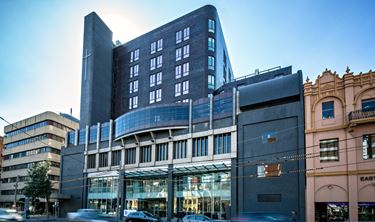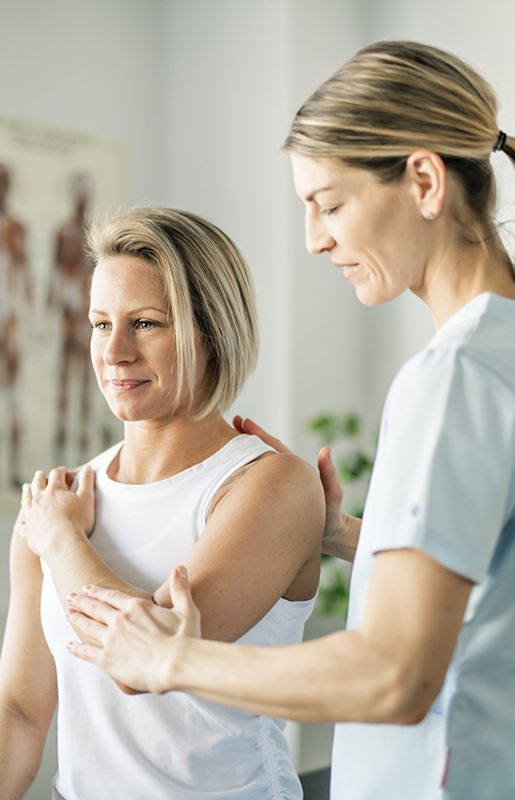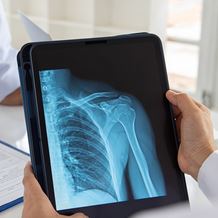Shoulder Replacement
- Home
- Services
- Orthopaedics
- Shoulder Orthopaedics
- Shoulder Replacement
Shoulder replacement surgeries and procedures
Shoulder replacement surgery is a safe and effective way to improve mobility and function, and is performed on thousands of people every year. If you are suffering from persistent shoulder pain and non-surgical treatment is not providing sufficient relief, our orthopaedic shoulder specialists are on hand to advise on the most appropriate treatment.
Total shoulder replacement surgery replaces the damaged parts of your shoulder joint with artificial materials to relieve pain and restore mobility and range of motion.
![]() Reverse total shoulder replacement
Reverse total shoulder replacement
Reverse total shoulder replacement surgery reverses the position of the shoulder’s ball and socket joint, and is suitable for patients with damaged rotator cuff muscles.
Revision shoulder replacement removes the old parts of your shoulder replacement that are no longer working and replaces them with new ones.
Partial shoulder replacement is a successful medical procedure that is used when only the head of the arm bone is affected by injury or disease.

- Jump to: Shoulder replacement recovery
Shoulder Replacement - Patient Journey
Shoulder replacement surgery, sometimes known as shoulder arthroplasty, is a very successful medical procedure that is performed on thousands of patients every year. There are different types of shoulder replacement surgery available that can help to relieve ongoing pain and restore function and mobility to your shoulder joint. We understand that any kind of medical procedure can be overwhelming, which is why we have multi-disciplinary teams on hand to support you at every stage. We are dedicated to providing all patients with a safe and comfortable experience at all times.
Deciding where to have your shoulder replacement surgery is extremely important, and you should take some time to research your options carefully. Ask your doctor for some recommendations and find out any relevant information, such as how many similar shoulder replacement surgeries have been performed previously. Once you are happy with your decision, you can book a consultation appointment with your chosen specialist.
At this appointment, your specialist will conduct a thorough medical examination and gather information about your general health. Once you have had any relevant tests such as an X-ray, CT or MRI (magnetic resonance imaging), you can discuss the different types of shoulder replacement surgery available to you. Your consultation can be used to answer any questions you may have about your condition, including how the surgery will be performed and what you can expect to happen. Once your doctor has advised on a course of treatment, you can begin to prepare for your hospital admission and surgery.
Your doctor will talk to you about what you need to do to prepare for shoulder replacement surgery. This may involve taking or stopping prescribed medications in advance of your procedure, and making some simple changes at home that will help your recovery. As your arm movement will be limited by a sling, make sure any essential items you will need are placed within low reach. Organise a friend to help you with shopping and daily tasks for the first few weeks after surgery until you are cleared to drive. When you arrive at hospital, our team will make sure you are comfortable, and your specialist will visit you to answer any final questions.
On the day of your operation, it is important to follow your surgeon’s fasting advice to prevent any delays to your surgery. Once at hospital, your anaesthetist will talk to you about the type of anaesthetic to be used and the procedure involved. The operation itself normally takes around 2-3 hours depending on the extent of the surgery. Once it is complete, you will transfer to the recovery ward.
After surgery it is normal to feel some pain. This will be managed with medication to help you feel comfortable. Arm and shoulder movement are very important for a successful recovery, and physiotherapists will be on hand to help you begin your exercise program to aid this process. Most patients spend 1-2 nights in hospital before being discharged back home, or onwards to rehabilitation if this is not possible.
Rehabilitation is a vital part of your recovery. It will help you quickly regain confidence and independence as well as avoid injury. You will be prescribed a specific set of exercises as part of your rehabilitation programme which are designed to strengthen your muscles, improve function and increase your range of motion. The first stage of rehabilitation is about gentle exercises that will protect your joint and allow it to heal, while preventing any stiffness or swelling. The second stage will focus on a progression of exercises that challenge your arm to move through the stiff range. Once this has been achieved, the third stage is about building up strength and re-engaging your joint so that you can achieve everyday tasks.
The final stage of recovery is about restoring full function, which includes more strenuous tasks and activities. This is often the longest stage and a full recovery can take up to one year. Our rehabilitation team includes physicians, physiotherapists and occupational therapists that will guide you each step of the way as you regain your strength.
Shoulder Replacement FAQs
- Pain when lifting your arms forwards, up high, or behind your back
- Pain when resting or sleeping
- Shoulder stiffness
- Pain deep in the shoulder joint
- Weakness or instability in the joint
Select a hospital for a specialist consultation and learn more about how you could benefit from shoulder replacement surgery.
Find a hospital with orthopaedic services
Our Hospitals




